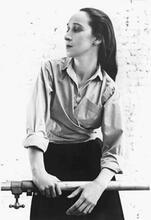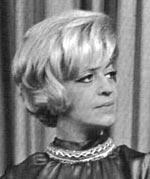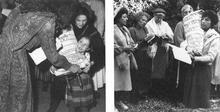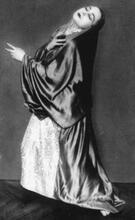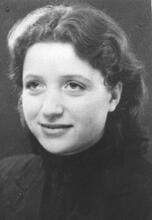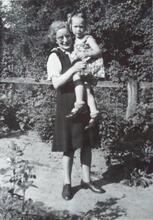Eva Sopher
Eva Sopher was born in Frankfurt, Germany, in 1923. In 1937, her family fled to São Paulo, Brazil, where Eva attended public school, learned Portuguese, and continued to pursue her artistic talents. At sixteen, Sopher began her work with the non-profit organization PROARTE to sponsor local artistic activity. In 1960, she moved to Porto Alegre with her husband, Wolfgang Klaus Sopher. In Porto Alegre, she continued representing PROARTE, promoting programs and cultural events. Sopher brought concert, theater, choir, and dance performances to the São Pedro theater, making Porto Alegre a cultural center renowned throughout Brazil. She remained the São Pedro theater’s manager for 41 years, throughout its nine-year renovation process and until her death in 2018.
Eva Sopher was the first known cultural entrepreneur in southern Brazil. Considered part of the history of theater-related cultural activities in Brazil and elsewhere, she worked in this field for over forty years in Porto Alegre, Rio Grande do Sul.
Early Life
Eva Margarete Plaut, daughter of Max (1889–1975), a banker, and Marie (1894–1980), a homemaker, was born in Frankfurt am Main, Germany, in 1923. She had an older sister, Lieselotte (1920–2000). Her early years were happy and carefree, but Nazism obliged the family to emigrate to São Paulo, Brazil, in 1937. The family’s story was similar to that of countless Jews who faced the problems of an unknown country and a new language. Eva attended public school, learned Portuguese, and continued to pursue her artistic talents, taking courses in drawing and sculpture. When she was sixteen, financial need compelled her to take a job at an arts and crafts store and art gallery whose owner, at his own expense, had founded a public, non-profit organization, PROARTE, to sponsor artistic activities. While working at Casa e Jardim (House and Garden) Eva met well-known intellectuals and artists, an experience that helped develop her artistic sense. In 1943 she moved to Rio de Janeiro, where she continued to seek art and culture.
PROARTE and São Pedro Theater Involvement
In 1946 she met and married Wolfgang Klaus Sopher (1918–1987), also a German immigrant, the son of the sculptor Bernhard Sopher (1879–1949), born in Safed, Palestine; during their life together, Wolfgang Sopher always enthusiastically supported his wife’s activities. In Rio de Janeiro, Sopher replaced her previous activity, artistic bookbinding, with plant and flower arranging, creating miniature gardens for sale. In Rio she continued to collaborate with PROARTE, and the couple’s move to Porto Alegre with their daughters Renata (b. 1948) and Ruth (b. 1949) in 1960 led to ever deeper involvement in culture, always as a representative of PROARTE. She promoted programs, flooding the city with concerts by famous international orchestras, virtuoso soloists, theater seasons, international choirs and dance companies. The PROARTE seasons were significant in the cultural life of Porto Alegre, performances usually taking place at the traditional Teatro São Pedro. Foreign artists began to include Porto Alegre in their itinerary as a major cultural center.
Eva Sopher’s success at PROARTE led to an invitation from the State Government to renovate Teatro São Pedro, a task that took nine years. For a while she combined her activities at PROARTE with the theater, but eventually, overwhelmed with work, she chose the latter.
Inaugurated in 1858, the São Pedro Theater had already undergone renovations superposing architectural styles but was again very rundown. Its reopening in 1984 was an event that Sopher considered the most significant in her life. The theater remained under her management for 41 years, until her death in 2018 at the age of 94.
Honors and Achievements
Sopher’s cultural work, which began with PROARTE and continued with the Theater, has been acclaimed by both the local and the international artistic communities, as is evidenced by the Brazilian and foreign awards, titles, and medals she received. In 1978 she was awarded the title of Chevalier dans l’Ordre des Arts et des Lettres by the French Government and in 1994 she received the German Grand Cross of Merit from Roman Herzog, the President of Germany. She was an advisor to Brazilian theaters and a board member of cultural organizations.
The interest of the local and national magazines and newspapers in Sopher herself as well as in her cultural activities demonstrates how important her work was not only for Porto Alegre but also for the entire country.
In testimonies and interviews, Eva Sopher referred to significant moments in her life. A major issue was her dual identity. Banned from Germany, she planted new roots in the country that received her. She felt uncomfortable at being considered German and saw herself as a Brazilian and Jew. In 1971 she received the title of honorary citizen of the city of Porto Alegre, which confirmed her choice of a new nationality.
Another significant moment in her life was the PROARTE concert for the one hundred and fiftieth anniversary of Brazilian independence in September 1972, at which the Israel Philharmonic Orchestra, conducted by Zubin Mehta, performed two days after the attack on the Jewish athletes at the Munich Olympics. This milestone symbolizes the root that was not torn out of her—her Judaism.
Moving with ease between the scholarly and the popular, Eva Sopher was proud of having been honored by Samba School in Porto Alegre during Carnival 1985, since it showed her integration into the society that received her, absorbing her culture and her way of life. With a storyline based on the history of the City Theater and its director, the performance showed how society at large acknowledged what Sopher represents socially and culturally.
Death and Legacy
In 2015 Sopher was awarded the Goethe Medal from the Federal Republic of Germany in recognition of her contribution to the cultural landscape of Porto Alegre and her dedication to international cultural exchange.
Eva Sopher died on February 7, 2018, in Porto Alegre. A three-day period of mourning was declared by the Governor of Rio Grande do Sul and by Porto Alegre’s mayor in honor of her passing. The São Pedro Theatre’s community cultural center was named in her memory.
“A Noite de Gala da Mulher-Destaque.” Revista Manchete n. 1128 (1973): 130–131.
Back, Andréa. “A Diva da Cultura em Porto Alegre.” Jornal Mundo Petrópolis. (1996): 6–7.
Belintani, Milton. “Essas Mulheres Maravilhosas e seus Incríveis Exemplos.” Revista Cláudia. n. 361 (out. de 1991): 294–298; Carvalho, Tânia.
“São Pedro, o Teatro mais Bonito do Mundo.” Revista Cláudia. n. 291, (1985): 20.
“Desde 1858.” Revista Visão. vol. 48 n. 3 (1976): 62; “Eva Sopher: Comemorando as Bodas de Prata com o Theatro São Pedro.” Revista Viva no Sul. n. 16 (2000): 34.
Dryer, Claudia. Eva eo teatro. 2008. Documentary.
“Eva Sopher.” Federação Israelita. n. 40 (2000): 10–11.
“Eva Sopher.” Jornal da Universidade. (2000): 6–7.
“Eva Sopher, o Espetáculo Pode Começar.” Revista Megainfo. n. 18 (2000): 8–12.
Hoffmann, Renato. “A Eterna Protagonista do São Pedro.” Extra Classe. n. 8 (1996): 24–25.
Hohlfeldt, Antônio (org.). Doce Fera: Fragmentos Biográficos de Eva Sopher. Porto Alegre: 1991.
“Insano e Eterno Amor.” Mulher/RS. n. 10 (2002): 4–5.
“Ícone da Cultura Gaúcha.” Revista Viva Música. n. 24 (Jan/Fev. 1997): 37.
Labaki, Aimar. “Magia de Eva.” Revista Vogue. n. 177 (1990): 8.
Lopes, Andréa. “Uma Eclética: Eva Sopher.” Revista Quem Acontece. (7 de dez. 2001): 71.
Schoroeder, Renato. “A Cidade Grata à Senhora.” Ícaro: Revista de Bordo da VARIG. VARIG Inflight Magazine. n. 68 (1990): 42–50.
“O Mundo da Arte.” Revista Tudo Aqui. n. 4 (out 1991/mar 1992): 16.
“Obrigado Dona Eva.” Revista Estilo Zaffari. n. 5 (1998/99): 14–20.
“O Show Não Pode Parar.” Revista House. n. 5 (1994): 18–23.
“Porto Alegre Restaura (e tomba) o Teatro São Pedro.” Revista Manchete. n. 1687 (1984): 108–109.
Theatro São Pedro: Álbum Ilustrado Comemorativo de sua Reinauguração 1858–1984. Porto Alegre, 2ª ed. 1992.
“Teatro São Pedro Devolvido ao Estado.” Jornal Zero Hora. (1999): 70.
Tomasi, Mônica. “A Casa da Dona Eva.” Revista Sentidos. n. 4 (2002): 40.
“Um Palco de Volta.” Revista Visão. n. 14 (1981): 39.
Vieira, Vitor. “De Volta ao Esplendor.” Revista Veja. n. 826 (1984): 72–73.
Andrade, Guaracy. “O Outro Lado de Eva Sopher.” Jornal Zero Hora. (2001): 6–7.
Survivors of the Shoá. Visual History Foundation. Interview 33.354/Eva Sopher. Porto Alegre, 1997. 1 Cassete, 75 min, NTSC VHS. FITA DE VÍDEO.
Teatro São Pedro. Templo da Cultura. Gabriel Rubin. Efficace/RBS Vídeo, Associação Amigos Teatro São Pedro. Porto Alegre, 1994/1995. 1 Cassete 17 min, col. FITA DE VÍDEO.



